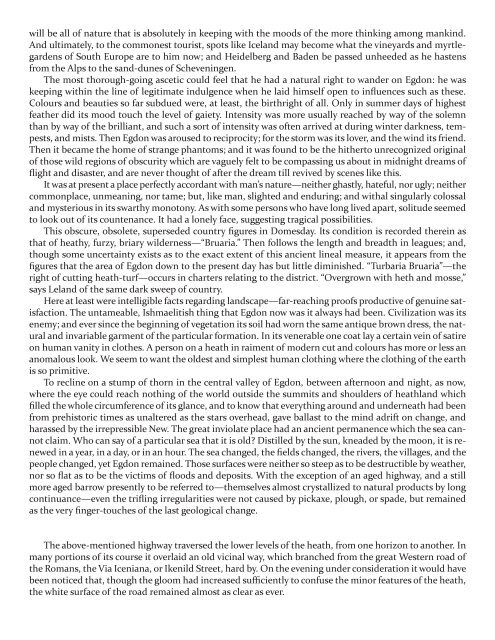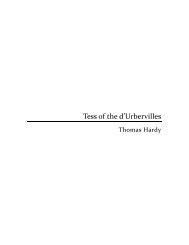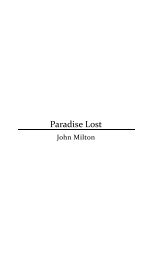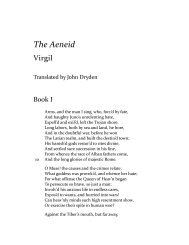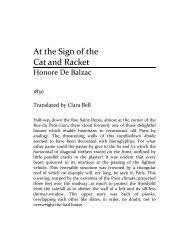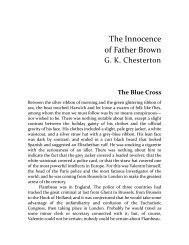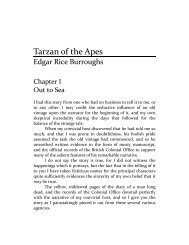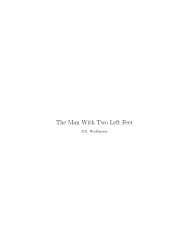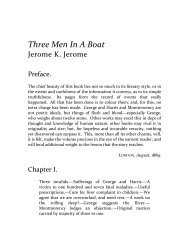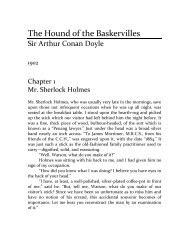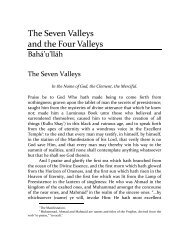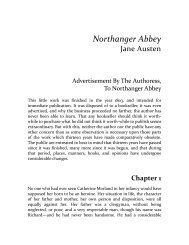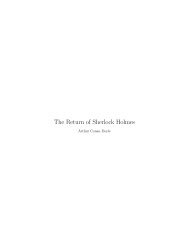Thomas Hardy - The Return of the Native.pdf - Bookstacks
Thomas Hardy - The Return of the Native.pdf - Bookstacks
Thomas Hardy - The Return of the Native.pdf - Bookstacks
You also want an ePaper? Increase the reach of your titles
YUMPU automatically turns print PDFs into web optimized ePapers that Google loves.
will be all <strong>of</strong> nature that is absolutely in keeping with <strong>the</strong> moods <strong>of</strong> <strong>the</strong> more thinking among mankind.<br />
And ultimately, to <strong>the</strong> commonest tourist, spots like Iceland may become what <strong>the</strong> vineyards and myrtlegardens<br />
<strong>of</strong> South Europe are to him now; and Heidelberg and Baden be passed unheeded as he hastens<br />
from <strong>the</strong> Alps to <strong>the</strong> sand-dunes <strong>of</strong> Scheveningen.<br />
<strong>The</strong> most thorough-going ascetic could feel that he had a natural right to wander on Egdon: he was<br />
keeping within <strong>the</strong> line <strong>of</strong> legitimate indulgence when he laid himself open to influences such as <strong>the</strong>se.<br />
Colours and beauties so far subdued were, at least, <strong>the</strong> birthright <strong>of</strong> all. Only in summer days <strong>of</strong> highest<br />
fea<strong>the</strong>r did its mood touch <strong>the</strong> level <strong>of</strong> gaiety. Intensity was more usually reached by way <strong>of</strong> <strong>the</strong> solemn<br />
than by way <strong>of</strong> <strong>the</strong> brilliant, and such a sort <strong>of</strong> intensity was <strong>of</strong>ten arrived at during winter darkness, tempests,<br />
and mists. <strong>The</strong>n Egdon was aroused to reciprocity; for <strong>the</strong> storm was its lover, and <strong>the</strong> wind its friend.<br />
<strong>The</strong>n it became <strong>the</strong> home <strong>of</strong> strange phantoms; and it was found to be <strong>the</strong> hi<strong>the</strong>rto unrecognized original<br />
<strong>of</strong> those wild regions <strong>of</strong> obscurity which are vaguely felt to be compassing us about in midnight dreams <strong>of</strong><br />
flight and disaster, and are never thought <strong>of</strong> after <strong>the</strong> dream till revived by scenes like this.<br />
It was at present a place perfectly accordant with man’s nature—nei<strong>the</strong>r ghastly, hateful, nor ugly; nei<strong>the</strong>r<br />
commonplace, unmeaning, nor tame; but, like man, slighted and enduring; and withal singularly colossal<br />
and mysterious in its swarthy monotony. As with some persons who have long lived apart, solitude seemed<br />
to look out <strong>of</strong> its countenance. It had a lonely face, suggesting tragical possibilities.<br />
This obscure, obsolete, superseded country figures in Domesday. Its condition is recorded <strong>the</strong>rein as<br />
that <strong>of</strong> heathy, furzy, briary wilderness—“Bruaria.” <strong>The</strong>n follows <strong>the</strong> length and breadth in leagues; and,<br />
though some uncertainty exists as to <strong>the</strong> exact extent <strong>of</strong> this ancient lineal measure, it appears from <strong>the</strong><br />
figures that <strong>the</strong> area <strong>of</strong> Egdon down to <strong>the</strong> present day has but little diminished. “Turbaria Bruaria”—<strong>the</strong><br />
right <strong>of</strong> cutting heath-turf—occurs in charters relating to <strong>the</strong> district. “Overgrown with heth and mosse,”<br />
says Leland <strong>of</strong> <strong>the</strong> same dark sweep <strong>of</strong> country.<br />
Here at least were intelligible facts regarding landscape—far-reaching pro<strong>of</strong>s productive <strong>of</strong> genuine satisfaction.<br />
<strong>The</strong> untameable, Ishmaelitish thing that Egdon now was it always had been. Civilization was its<br />
enemy; and ever since <strong>the</strong> beginning <strong>of</strong> vegetation its soil had worn <strong>the</strong> same antique brown dress, <strong>the</strong> natural<br />
and invariable garment <strong>of</strong> <strong>the</strong> particular formation. In its venerable one coat lay a certain vein <strong>of</strong> satire<br />
on human vanity in clo<strong>the</strong>s. A person on a heath in raiment <strong>of</strong> modern cut and colours has more or less an<br />
anomalous look. We seem to want <strong>the</strong> oldest and simplest human clothing where <strong>the</strong> clothing <strong>of</strong> <strong>the</strong> earth<br />
is so primitive.<br />
To recline on a stump <strong>of</strong> thorn in <strong>the</strong> central valley <strong>of</strong> Egdon, between afternoon and night, as now,<br />
where <strong>the</strong> eye could reach nothing <strong>of</strong> <strong>the</strong> world outside <strong>the</strong> summits and shoulders <strong>of</strong> heathland which<br />
filled <strong>the</strong> whole circumference <strong>of</strong> its glance, and to know that everything around and underneath had been<br />
from prehistoric times as unaltered as <strong>the</strong> stars overhead, gave ballast to <strong>the</strong> mind adrift on change, and<br />
harassed by <strong>the</strong> irrepressible New. <strong>The</strong> great inviolate place had an ancient permanence which <strong>the</strong> sea cannot<br />
claim. Who can say <strong>of</strong> a particular sea that it is old? Distilled by <strong>the</strong> sun, kneaded by <strong>the</strong> moon, it is renewed<br />
in a year, in a day, or in an hour. <strong>The</strong> sea changed, <strong>the</strong> fields changed, <strong>the</strong> rivers, <strong>the</strong> villages, and <strong>the</strong><br />
people changed, yet Egdon remained. Those surfaces were nei<strong>the</strong>r so steep as to be destructible by wea<strong>the</strong>r,<br />
nor so flat as to be <strong>the</strong> victims <strong>of</strong> floods and deposits. With <strong>the</strong> exception <strong>of</strong> an aged highway, and a still<br />
more aged barrow presently to be referred to—<strong>the</strong>mselves almost crystallized to natural products by long<br />
continuance—even <strong>the</strong> trifling irregularities were not caused by pickaxe, plough, or spade, but remained<br />
as <strong>the</strong> very finger-touches <strong>of</strong> <strong>the</strong> last geological change.<br />
<strong>The</strong> above-mentioned highway traversed <strong>the</strong> lower levels <strong>of</strong> <strong>the</strong> heath, from one horizon to ano<strong>the</strong>r. In<br />
many portions <strong>of</strong> its course it overlaid an old vicinal way, which branched from <strong>the</strong> great Western road <strong>of</strong><br />
<strong>the</strong> Romans, <strong>the</strong> Via Iceniana, or Ikenild Street, hard by. On <strong>the</strong> evening under consideration it would have<br />
been noticed that, though <strong>the</strong> gloom had increased sufficiently to confuse <strong>the</strong> minor features <strong>of</strong> <strong>the</strong> heath,<br />
<strong>the</strong> white surface <strong>of</strong> <strong>the</strong> road remained almost as clear as ever.


